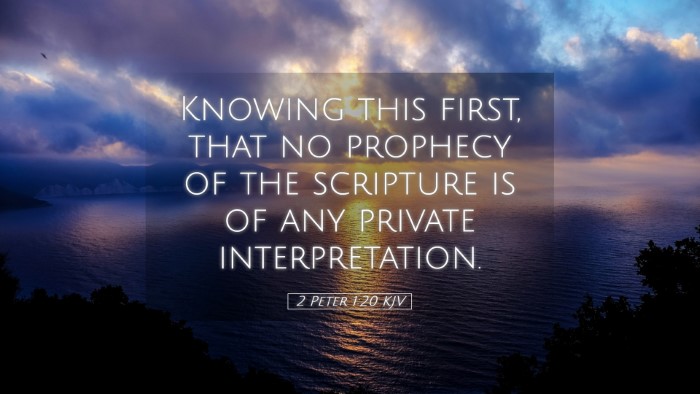Old Testament
Genesis Exodus Leviticus Numbers Deuteronomy Joshua Judges Ruth 1 Samuel 2 Samuel 1 Kings 2 Kings 1 Chronicles 2 Chronicles Ezra Nehemiah Esther Job Psalms Proverbs Ecclesiastes Song of Solomon Isaiah Jeremiah Lamentations Ezekiel Daniel Hosea Joel Amos Obadiah Jonah Micah Nahum Habakkuk Zephaniah Haggai Zechariah Malachi2 Peter 1:20
2 Peter 1:20 KJV
Knowing this first, that no prophecy of the scripture is of any private interpretation.
2 Peter 1:20 Bible Commentary
Commentary on 2 Peter 1:20
Verse: "Knowing this first, that no prophecy of the scripture is of any private interpretation."
Introduction
In 2 Peter 1:20, the Apostle Peter underscores the nature of scripture and the prophetic word. This verse serves as a foundation for understanding the authority of biblical prophecy, stressing that it arises from God and is not a product of individual interpretation. This commentary unpacks the theological implications of this scripture while referencing insights from renowned commentators.
The Nature of Prophecy
Matthew Henry notes that prophecy is divinely inspired and is meant to reveal God's will to humanity. He argues that the prophecies found within scripture are not born out of personal insight or human creativity, but rather they are the result of a profound revelation from God.
Furthermore, Albert Barnes emphasizes that the source of prophecy is the Holy Spirit. He posits that true prophecy conveys the mind and will of God, aiming to guide believers in understanding His purpose. Thus, no prophecy can be detached from its divine origin.
The Concept of 'Private Interpretation'
The phrase "private interpretation" implies an interpretation that is subjective and disconnected from the collective understanding of the church. Adam Clarke elaborates that this does not mean individual understanding is prohibited; rather, it cautions against personal biases that distort the truth of scripture. He posits that interpretations should align with the broader teachings of scripture and the tradition of the faith community.
Consequences of Misinterpretation
- Theological Errors: Misinterpretation leads to theological deviations that can mislead the faithful. Matthew Henry warns that a loose interpretation opens the door to false teachings.
- Spiritual Confusion: Albert Barnes highlights that misunderstanding scripture can lead to confusion within the church, undermining the unity and clarity that God's word is intended to provide.
- Loss of Authority: Adam Clarke notes that treating scripture as subject to personal whims diminishes its authority, placing individual opinion above divine revelation.
Authority of Scripture
In understanding 2 Peter 1:20, it is vital to grasp the authority that scripture possesses. The inspired nature of scripture demands that it be treated with reverence. Matthew Henry asserts that recognizing scripture's divine origin is fundamental for its proper interpretation and application.
Albert Barnes similarly insists that the authority of scripture is non-negotiable. The insight provided through divine prophecy must be meditated upon and accepted as truth by the believer.
The Role of the Holy Spirit
A central theme in the interpretation of scripture is the role of the Holy Spirit. Adam Clarke articulates that it is the Spirit who guides the understanding of the believer, helping them to apprehend the deeper meanings of the prophetic word. This assistance is crucial in guarding against misunderstandings and ensuring a faithful interpretation.
Hence, the act of interpreting scripture is not merely an academic exercise; it requires spiritual discernment and reliance on the Holy Spirit for illumination.
The Communal Aspect of Interpretation
Understanding the communal nature of biblical interpretation is essential. Matthew Henry posits that scripture is to be interpreted within the context of the church. The early church relied upon the collective wisdom of the apostolic community, which helps maintain doctrinal purity. This communal aspect allows for checks and balances wherein interpretations can be vetted against the established teachings of the faith.
Albert Barnes further suggests that community interpretation does not invalidate personal reflection, but rather enhances it by grounding individual insights in shared beliefs and experiences.
Conclusion
2 Peter 1:20 serves as a critical reminder of the nature of scripture and prophecy. Through our exploration of various commentaries, we see that biblical prophecy is a divine revelation, not subject to personal whims, but rather to the collective understanding rooted in the teachings of the church and guided by the Holy Spirit. As pastors, students, theologians, and scholars engage with this text, they are called to approach scripture with reverence, seeking not only personal understanding but also grasping the larger context of faith community and divine intention.


